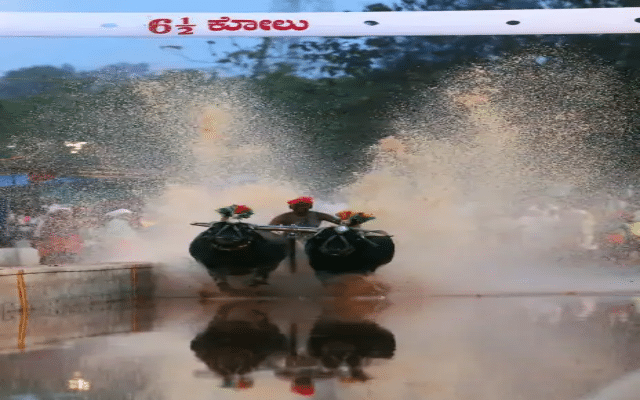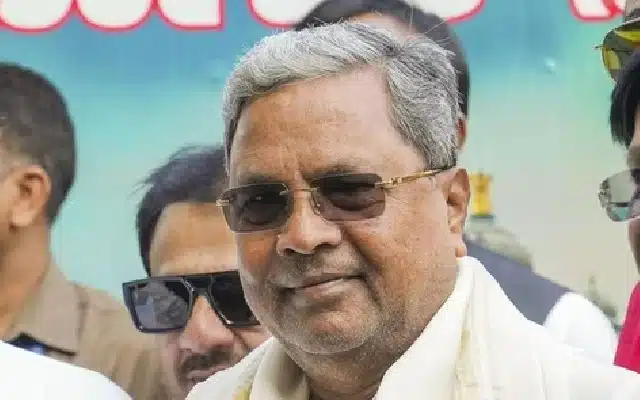On November 25 and 26, 160 pairs of buffaloes and their jockeys will compete in the Kambala races at Bengaluru’s City Palace Grounds on specially constructed slush tracks.
Even though the Supreme Court has previously examined the traditional racing event, Kambala, along with Jallikattu and bullock-cart racing, was outlawed in 2014, thousands of people are still anticipated to attend the location. State governments subsequently changed the law to permit them to continue.
What is Kambala?
It is a folk sport practised in coastal Karnataka districts, especially in regions where Tulu speakers form a majority. Earlier, races would be organised by various families and groups in the slushy paddy fields, in the days after the harvest. More recently, the Kambala Samithi hosts weekly events from the end of November till the first half of April at various venues across Dakshina Kannada and Udupi districts.
For many families, particularly those from the Bunt community in the coastal regions, Kambala is a prestigious occasion. They train pairs of buffaloes all year long in the hopes of winning other races or a significant Kambala event.
What are the different categories in Kambala?
Kambala is generally held under four categories. First is Negilu (plough) category, where lighter ploughs are used to tie buffaloes for the race. The event is for entry-level buffalo pairs, participating in their first Kambala race.
The second is called Hagga (rope), in which jockeys compete against buffaloes using only a rope fastened to each animal. The third category is called Adda Halage, and it involves competitors standing over a horizontal plank that buffaloes are pulling. In Adda Halage, the jockeys are pulled by buffaloes, as opposed to Hagga and Negilu, where the jockeys run behind the animals.
The fourth category, Kane Halage, involves tying a wooden plank to a buffalo. As the plank is dragged along the slush tracks, water shoots out of two holes in the plank, which jockeys stand on. The winner of the competition is determined by how high the water splashes.
What is the expected number of teams competing in Bengaluru Kambala?
Approximately 228 teams initially registered under the four categories, of which 160 pairs competed in the races on November 25 and 26. Bengaluru Kambala organizers have declared that the first prize winner will receive gold and a cash prize of Rs 1.5 lakh.
An incentive of Rs 50,000 was provided to bring the buffaloes to Bengaluru for the Kambala, in order to encourage more teams to compete in the competition held in the state capital.
Is Kambala popular across Karnataka?
Though the popularity of the races is restricted to coastal Karnataka, the organisers believe that popular depictions of the sport, such as in the 2022 movie ‘Kantara’, have given the event a pan-Karnataka appeal.
Puttur MLA Ashok Rai, one of the main organisers of the event, credited the movie’s success for generating an interest in the sport.
Why did the Supreme Court ban Kambala?
A petition against all traditional sporting events was filed by a number of organizations, including People for the Ethical Treatment of Animals (PETA), in response to claims of animal abuse.
The complaint against Kambala was that the buffaloes’ noses were tied with ropes and they were continually whipped throughout the race, which was cruel. In 2014, the Supreme Court, which considered these petitions, decided to outlaw bullock cart racing, Kambala, and jallikattu.
How was the ban lifted?
In January 2016, the Environment Ministry issued a notification where an exception was made, “that bulls might be continued to be trained as performing animals at events such as Jallikattu in Tamil Nadu and Bullock Cart Races in Maharashtra, Karnataka, Punjab, Haryana, Kerala and Gujarat in the manner…or practice traditionally under the customs or as part of culture in any part of the country”. This was in recognition of the customs and cultural heritage of various communities.
An exception, however, was made subject to certain conditions seeking to reduce the pain and suffering of bulls while being used in such sports.
Concurrently, state legislatures modified the Prevention of Cruelty to Animals Act’s clauses to grant an exception for such occasions. A five-judge constitutional bench upheld the changes made by the governments of Karnataka, Tamil Nadu, and Maharashtra in May of this year, despite challenges to the amendments.
Why is Kambala accused of caste discrimination?
Historically, members of the Koraga community faced discrimination before the festival kicked off. Koragas, who were considered ‘untouchable’ were ill-treated during the course of Kambala in the past.
Even today, critics argue, the sport is controlled by dominant caste groups while those considered ‘lower caste’ end up doing menial jobs as part of the event.
Read More:
‘Karnataka Welcomes KCR: Siddaramaiah’s Invite to Witness True Welfare | News Karnataka
Devastating road crash after B’luru Kambala: 2 dead, 3 injured | News Karnataka

















